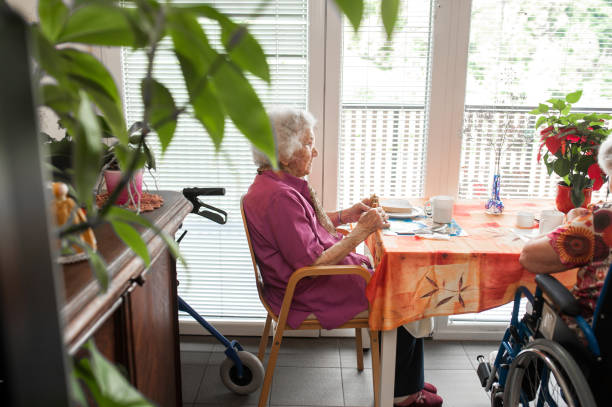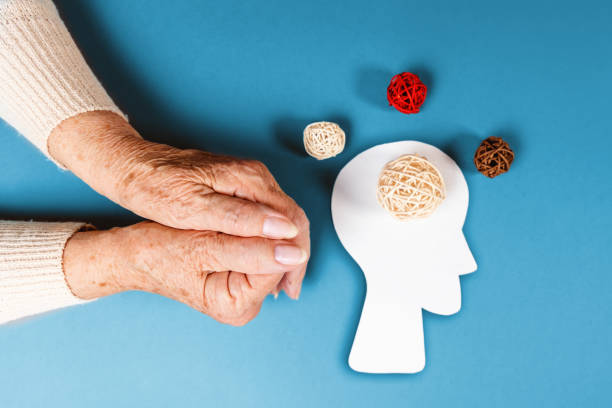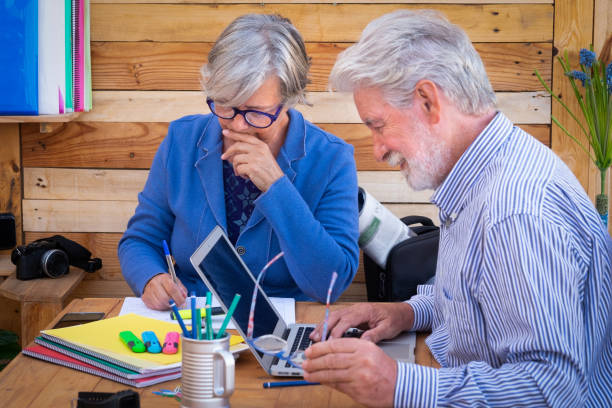Introduction

Using essential aids can make daily activities more manageable and enjoyable for those living with Parkinson's disease, as it presents a unique set of challenges. Parkinson's disease affects millions of individuals worldwide, causing tremors, stiffness, and difficulty with movement.
However, by utilizing a range of carefully designed assistive devices, individuals with Parkinson's can regain independence and enhance their quality of life. This blog post will discuss various helpful tools that can assist Parkinson's disease patients in performing daily tasks more comfortably, giving them improved confidence and ease in their routine.
Planning Daily Activities With Parkinson's Disease
Living with Parkinson's Disease (PD) can seem daunting and overwhelming. Managing daily activities can be especially difficult, as the symptoms of PD often make it harder to perform everyday tasks. Managing daily activities can be made easier for individuals living with PD by using appropriate tools and strategies.
Plan periods of rest:
Rest is an essential part of managing your Parkinson's symptoms. Respite from physical activity can help reduce fatigue, improve movement problems, and minimize the side effects of medications. Creating a schedule for taking breaks throughout the day is crucial.
Scheduling a nap during the day will give your body time to rest and recharge. You can also take regular breaks from physical activities, even if just a few minutes of sitting down or putting your feet up. If you sleep at night, aim for 8 to 10 hours, as this will help optimize the body's ability to relax and manage Parkinson's symptoms more effectively.
Conserve your energy:
It's important to conserve your energy when managing Parkinson's symptoms to make everyday activities easier. Moving your body takes a lot of energy, so it's important to use the minimum amount possible for each activity, including tasks like dressing, showering, cooking, and walking. To conserve energy, try breaking tasks down into smaller steps that require less effort. For instance, when dressing, you can put on one piece of clothing at a time instead of trying to do everything at once.
When walking or exercising, try not to over-exert yourself. Instead, focus on being mindful and using your movements efficiently. Being mindful of your posture and its impact on your energy levels is crucial. Slouching can cause more muscle strain and, therefore, use more energy.
Energy Conserving Tips for Those With Parkinson's Disease

Here are 10 energy-conserving tips for those with Parkinson's Disease that can help make daily activities easier.
1. Minimize unnecessary movement:
Moving around too much can lead to fatigue more quickly. Doing simple exercises throughout the day can help conserve energy, and focusing on moving only when necessary will result in a longer-lasting charge of energy for other activities.
2. Pace yourself:
Getting caught up in tasks and doing them too quickly can be easy, but it's important to pace oneself throughout the day. This will help ensure that energy is conserved for other activities during the day or later in the evening.
3. Utilize alternative modes of transportation:
Carrying heavy bags or walking long distances can be challenging for those with Parkinson's Disease. Public transportation, such as buses or taxis, can help conserve energy and make daily activities easier.
4. Schedule rest times:
Ahead in the day for rest periods will allow for more energy throughout the day. This can help conserve energy and reduce fatigue during stressful activities.
5. Eat healthily:
Eating a balanced diet is important to maintain energy levels throughout the day. Avoiding sugary, processed foods and choosing nutrient-dense options will provide more sustained energy and improve overall health.
6. Exercise regularly:
Exercise can help increase energy levels, and regular exercise also improves endurance. It is important to avoid excessive strain or pushing the body too much, as it can cause fatigue to set in sooner.
7. Take breaks:
Taking frequent short breaks throughout the day will allow for more sustained energy. During these short breaks, sit down and relax for a few minutes to help restore and conserve energy.
8. Utilize assistive devices:
Using assistive devices like wheelchairs, canes or walkers can make daily activities easier and help conserve energy.
9. Get enough sleep:
For people with Parkinson's Disease, it is important to get sufficient sleep because it helps to replenish energy levels. This will help conserve energy during the day and allow more activities to be done easily.
10. Enlist support:
Requesting assistance from your family or friends can lessen stress and tiredness and save energy. Having someone who can assist will make daily activities easier and less tiring for the body.
These energy-conserving tips are essential for those with Parkinson's Disease as they help make daily activities easier. It is important to prioritize self-care. These suggestions can help you save energy and maintain physical activity throughout the day.
What are the helpful aids for Parkinson's patients?

Parkinson's patients often need assistance with daily activities such as dressing, eating, and bathing. The effects of the disease on motor skills make many of these activities more physically demanding than usual. Essential aids for Parkinson's patients can help make these tasks easier and less stressful.
Mobility Aids
Patients with Parkinson's can use mobility aids like wheelchairs, walkers, and canes to move around safely and independently. The use of mobility aids may also help to reduce fatigue and the risk of falls.
Dressing Aids
Dressing aids such as adaptive clothing, long-handled shoe horns, and dressing sticks can make it easier for Parkinson's patients to dress or be dressed by a caretaker. These aids can also help to reduce the risk of skin irritation and soreness caused by repetitive motions or excessive stretching.
Eating Aids
Eating aids such as weighted utensils, plate guards, and plate stabilizers make eating easier for Parkinson's patients. Weighted utensils are usually heavier than regular utensils, making them easier to hold and maneuver. Plate guards attach to the edge of a plate, preventing food from spilling off onto clothing or furniture. Plate stabilizers can be placed on the table before the user to keep plates from sliding around while eating.
Bathing Aids
People with Parkinson's disease can use bathing aids such as shower chairs, bath benches, and grab bars to make bathing easier and safer. Shower chairs provide a stable seating surface that helps them avoid slipping or sliding around while in the shower. Bath benches are useful for those who need assistance getting into the bathtub and providing support while bathing. Grab bars can also be installed in bathrooms to provide additional stability when getting in and out of the shower or bathtub.
Lifting Aids
Lifting aids such as transfer boards and gait belts can help Parkinson's patients move from one surface to another with less strain on their bodies. Transfer boards are designed to bridge two surfaces, making it easier for a person to slide across them without lifting themselves. Gait belts are a type of belt that can be used for lifting and transferring patients from one surface to another, providing extra support and stability.
These essential aids can make daily activities easier and less stressful for Parkinson's patients. By using these tools, individuals can do the things they like with more freedom and less tiredness. To find out which aids would be most beneficial for their specific needs, it is crucial to consult with a healthcare provider. Parkinson's patients can lead a fulfilling life with the appropriate assistance.
How can I make my life easier with Parkinson's?
Life easier with Parkinson's Disease can be made possible using essential aids. Equipment's and devices chosen by a person with Parkinson's disease can significantly affect their quality of life as they help in staying independent and managing their symptoms efficiently. In particular, selecting an appropriate mobility aid is a crucial factor in improving their daily life. A motorized scooter or wheelchair can provide individuals with greater independence and flexibility, allowing them to get around more easily and reduce fatigue from walking. Additionally, a standing frame can benefit those exhibiting symptoms that limit their ability to stand or walk.
Another way to make life easier with Parkinson's is by employing simple strategies for independence. Many individuals succeed in things like breaking tasks into smaller, more manageable steps and providing ample reminders to keep on track with medications and other treatments. It can also be helpful to use assistive devices such as grab bars or handles around the home, specially designed utensils or plates, and magnifying tools for reading.
FAQ's
What are craft activities for Parkinson's patients?
Craft activities for Parkinson's patients can include any art-making activity involving small, precise hand movements. Examples may include painting, drawing, sculpting, beading, and jewelry. Doing craft activities can help to promote coordination and dexterity in those with Parkinson's Disease.
What home exercises can you do with Parkinson's?
Home exercises for Parkinson's Disease can include various activities to help improve strength, balance, and mobility. Examples may include leg raises, stair climbing, squats, arm curls, stretching exercises, and walking with support from a cane or walker. Performing these exercises regularly can aid in improving physical functioning and quality of life.
What activities prevent Parkinson's?
There is no surefire way to prevent Parkinson's Disease. However, certain activities may reduce the risk of developing the condition. It is recommended that you maintain good health by consistently exercising, eating a balanced diet, getting enough sleep, and avoiding excessive smoking and drinking.
Does physical activity help Parkinson's?
It is true that engaging in physical activity is advantageous for individuals with Parkinson's Disease. It can enhance muscle strength, mobility, curb tiredness, and foster positive mental health. However, before commencing any exercise regimen, it is crucial to seek advice from a medical practitioner.
What are some strategies to treat Parkinson's disease symptoms?
Various strategies can be used to treat Parkinson's Disease symptoms. These may include medication, physical therapy, occupational therapy, speech therapy, and lifestyle changes such as diet and exercise. Assistive devices are available to improve the quality of life for individuals with Parkinson's. These aids can include mobility aids such as wheelchairs and scooters, as well as grab bars, utensils, and magnifying tools for reading.
Can you have a normal life with Parkinson's?
Individuals with Parkinson's Disease can lead a normal life with proper treatment and support from loved ones. Managing does not necessarily prevent them from participating in their favorite activities. Additionally, many strategies can be employed to make daily activities easier, such as breaking tasks into smaller steps, using assistive devices, creating reminders, and employing coping techniques to manage stress. Parkinson's Disease doesn't have to prevent someone from living a fulfilling life if approached correctly.
Conclusion
I hope that you have gained useful insights from this article regarding the importance of useful tools in making daily tasks easier for people who have Parkinson's disease. With the right treatment, support, and effective techniques, people with Parkinson's can lead fulfilling lives. If you have any inquiries or concerns, it is advisable to consult your physician for further guidance.

